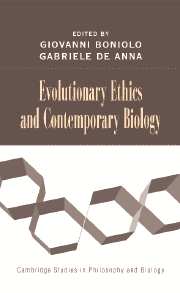Book contents
- Frontmatter
- Contents
- List of Contributors
- Evolutionary Ethics and Contemporary Biology
- Introduction
- PART I THE LIMITS OF EVOLUTIONARY EXPLANATIONS AND JUSTIFICATIONS OF ETHICS
- PART II METHODOLOGICAL ISSUES CONCERNING EVOLUTIONARY ACCOUNTS OF ETHICS
- PART III HOW BIOLOGICAL RESULTS CAN HELP EXPLAIN MORALLY RELEVANT HUMAN CAPACITIES
- PART IV HOW BIOLOGICAL RESULTS CAN HELP EXPLAIN MORAL SYSTEMS
- 8 Biology to Ethics: An Evolutionist's View of Human Nature
- 9 Between Fragile Altruism and Morality: Evolution and the Emergence of Normative Guidance
- 10 Will Genomics Do More for Metaphysics Than Locke?
- Index
- Cambridge Cultural Social Studies
- References
9 - Between Fragile Altruism and Morality: Evolution and the Emergence of Normative Guidance
Published online by Cambridge University Press: 23 July 2009
- Frontmatter
- Contents
- List of Contributors
- Evolutionary Ethics and Contemporary Biology
- Introduction
- PART I THE LIMITS OF EVOLUTIONARY EXPLANATIONS AND JUSTIFICATIONS OF ETHICS
- PART II METHODOLOGICAL ISSUES CONCERNING EVOLUTIONARY ACCOUNTS OF ETHICS
- PART III HOW BIOLOGICAL RESULTS CAN HELP EXPLAIN MORALLY RELEVANT HUMAN CAPACITIES
- PART IV HOW BIOLOGICAL RESULTS CAN HELP EXPLAIN MORAL SYSTEMS
- 8 Biology to Ethics: An Evolutionist's View of Human Nature
- 9 Between Fragile Altruism and Morality: Evolution and the Emergence of Normative Guidance
- 10 Will Genomics Do More for Metaphysics Than Locke?
- Index
- Cambridge Cultural Social Studies
- References
Summary
BIOLOGICAL ALTRUISM
Philosophical discussions of the relationship between biology and morality often gravitate to one of two positions. At the Hobbesian pole are views claiming that human nature is fundamentally selfish and that morality is a system that restrains and runs contrary to our most basic impulses. The Humean pole, by contrast, develops the idea that human beings have a natural disposition to fellow feeling, one that our moral sentiments are able to extend and refine. I hope to explain, and partially defend, a position that combines elements of both perspectives.
Both Hobbesians and Humeans take a stand on the question of altruism, and it is natural to start from our current biological understanding of the possibility (or possibilities) of altruism. For evolutionary biologists, of course, altruistic behavior is understood as behavior that increases the reproductive success of another organism at reproductive cost to the beneficiary. Throughout the twentieth century, biology faced the theoretical problem of how to reconcile the possibility of altruistic behavior with Darwinian natural selection. I am not going to dwell on the details of the history. It is enough to note that, by the end of the century, the problem had been largely solved. Thanks to theories of kin selection and reciprocal altruism, to evolutionary game theory, and to a refined version of group selection, there are ample devices for showing the general possibility that altruistic behavior can originate and be maintained under natural selection.
- Type
- Chapter
- Information
- Evolutionary Ethics and Contemporary Biology , pp. 159 - 177Publisher: Cambridge University PressPrint publication year: 2006
References
- 2
- Cited by

